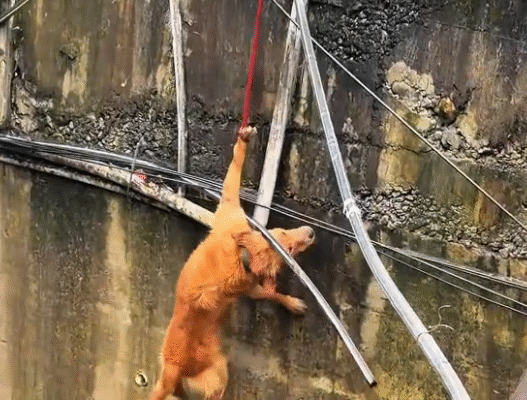It was a quiet Sunday morning in the small riverside village where life usually moved at a slow and peaceful pace. The air was cool, the birds were singing, and the gentle flow of the river provided a calming background hum. But that morning, something unusual broke the tranquility—a high-pitched barking, frantic and desperate.
Lina, a young woman in her early twenties, had just finished feeding her chickens when she heard the sound. She paused, tilted her head, and listened carefully. The barking was not from any of the neighborhood dogs she recognized. It was wild, panicked, and seemed to be coming from the direction of the river.
Without hesitation, Lina dropped her feed bucket and ran toward the riverbank. As she approached, the sound grew louder and more erratic. When she reached the wooden dock that extended into the water, she saw a small, scruffy dog struggling to stay afloat in the murky current. Its legs were paddling furiously, and its eyes were wide with fear.
“Oh no!” Lina gasped, her heart racing. The dog was clearly exhausted, and it wouldn’t last much longer.
There was no one else around. She didn’t have time to run back for help.
Lina kicked off her shoes and dove into the water without a second thought. The shock of the cold river hit her body, but adrenaline kept her moving. She swam swiftly toward the struggling animal, calling out in a gentle voice.
“It’s okay, I’ve got you! Just hang on!”

The dog’s strength was fading, and it had begun to slip under the surface when Lina reached it. She grabbed the pup gently but firmly and wrapped one arm around its midsection. With the other arm, she paddled back to the dock, both of them shaking from the cold.
When they reached the bank, Lina hoisted the dog onto the dock first, then pulled herself up beside him. Soaked, shivering, and gasping for breath, she reached out to comfort the dog, who looked at her with tired, thankful eyes. It didn’t growl or try to run—it simply laid its head down, too exhausted to move.
The dog was in bad shape—skinny, covered in mud, and with patches of missing fur. Lina wrapped it in her sweater and carried it back to her home. Her family was surprised to see her soaked and muddy, but when they saw the little dog wrapped in her arms, they understood.
“What happened?” her mother asked as she brought towels and warm water.
“He fell into the river,” Lina replied. “He was drowning. I had to help.”
Her father nodded and gave her a proud smile. “You did the right thing.”
Over the next few hours, Lina and her family worked together to clean the dog up. They washed off the grime, fed him a warm bowl of rice and chicken, and dried him gently with towels. The dog, though weak, slowly began to perk up. He wagged his tail lightly and licked Lina’s hand.
Lina decided to name him Lucky.
That night, Lucky slept curled up in a blanket at the foot of Lina’s bed. He was still cautious and nervous, flinching at loud sounds or sudden movements, but he seemed to understand that he was finally safe.
In the days that followed, Lina took Lucky to the local vet, who confirmed he had no serious injuries—just malnourishment and a few skin issues. The vet guessed Lucky had been living on the streets for months. Lina posted about him on social media and put up flyers around the village, in case he belonged to someone, but no one came forward.
Over time, Lucky grew stronger, happier, and more trusting. He followed Lina everywhere, his tail wagging, eyes bright. The bond between them became undeniable.
Neighbors often commented on the transformation.
“Is that the same little dog that fell into the river?” one of them asked. “He looks so different now—so happy!”
Lina smiled. “Yes, he’s a survivor.”
Lucky had not only survived the river but found a new home and a new life. Lina often thought about how easily things could’ve gone differently if she hadn’t heard him, or if she had arrived a minute too late.
But she didn’t dwell on what-ifs. She was just grateful that she had been in the right place at the right time, and that she had followed her instincts.
The experience taught Lina a powerful lesson. Compassion doesn’t need a plan. It doesn’t wait for permission or perfect conditions. When someone—or something—is in need, your heart knows what to do. Lucky had needed help, and she had given it.
Months passed, and Lucky became a village favorite. Children played with him, older folks patted his head as he walked by, and everyone knew his story. He was more than just a rescued stray—he was a symbol of kindness and second chances.
One summer evening, as the sun set behind the trees and the river glowed gold in the fading light, Lina sat on the dock where it had all started. Lucky lay beside her, his head on her lap, tail thumping lazily against the wood.
She looked out over the water, peaceful once again, and thought about how much that one moment had changed both their lives. Saving Lucky hadn’t just rescued him—it had brought new joy and meaning into her own life too.
In the end, it wasn’t just a story about a dog who fell into the water.
It was a story about love, about courage, and about how sometimes, when we least expect it, we’re given a chance to be a hero—even if it’s just for one small, grateful life.
And to Lucky, that made all the difference in the world.



